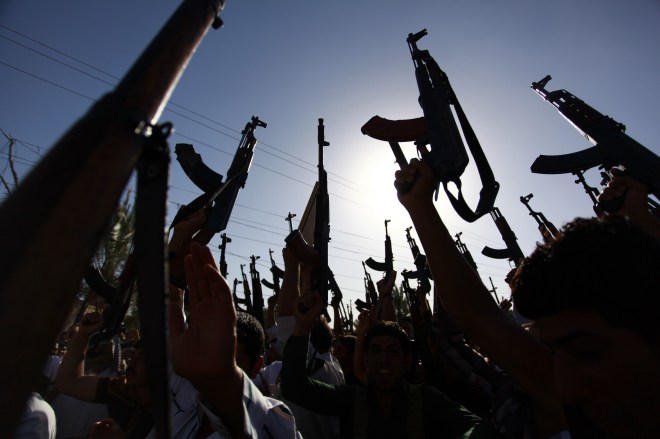The great and wonderful thing about being a neoconservative is not just that you never have to come to terms with your mistakes – because you are never, ever wrong – but you can also write the same column again and again across decades and Washington will still find you a deep and meaningful thinker. You know the two-step by now: plug in any foreign crisis, call it the 1930s, campaign for war, and pick up your welfare check from a think tank.
Here’s Bob Kagan, as noted by Peter Beinart, on the rise of ISIS among the Sunnis in Iraq after the war Kagan championed and has never apologized for:
The Obama Administration’s current policy invites Islamist adventurism abroad and repression at home. At the beginning of this bloody century, we all should have learned that appeasement, even when disguised as engagement, doesn’t work.
Actually, those sentences were slightly adapted from a column Kagan wrote in 1998, when he and Bill Kristol were itching for a fight with China (which was as good as they could get at the time, before al Qaeda came along). They didn’t get their Cold War then, but after 9/11, they sure hit the jackpot. Their conclusion from those futile, costly catastrophes? Let’s have another one – to deal with the fateful consequences of the first.
But really: Chamberlain again? 1931? Are they that lazy? Yes they are! But how does someone in 2014 actually write the following?
Until recent events, at least, a majority of Americans (and of the American political and intellectual classes) seem to have come close to concluding not only that war is horrible but also that it is ineffective in our modern, globalized world.
Gee, Bob, why on earth would any American conclude that war is ineffective these days? Maybe it’s because we tried it for a decade in Iraq and made things far worse than they were in the first place. Maybe it’s because the longest ever American war in Afghanistan seems destined for the exact same conclusion. Maybe because we’ve seen its horrors in the memories of so many whom we have lost and the faces of so many more trying to overcome the trauma – physical and emotional – of the horror in Iraq he and I urged upon the country so eagerly.
Beinart sketches the extraordinary number of wars, air-strikes, drone-strikes and the like that have already gone on under this administration:
Near the end of his first year in office, President Obama sent 30,000 additional troops to Afghanistan. That same year, he began an expansion of America’s drone program that would lead him to authorize eight times as many strikes (so far) as George W. Bush did. In 2011, the Obama administration helped militarily depose Muammar al-Qaddafi. Over the last month, it has launched 130 airstrikes in Iraq, with more almost certainly to come, perhaps in Syria as well.
If this is appeasement, what would the alternative look like? A full-scale military confrontation with Russia? Another occupation of Iraq? A war with Iran? Kagan doesn’t say, of course, his silence on this as damning as his silence on Iraq and Afghanistan. To take his absurd analogy at face value, it would require re-invading Germany once again in 1920 – just two years after the First World War.
This is not an argument; it’s a feeling. And the feeling is fear directed outward with violence and aggression. It comes perilously close to seeing perpetual war almost as an end in itself, an instrument to maintain and expand global hegemony, even after it has bitten us again and again in the ass. It sees only good motives – not unintended consequences. And you see in it a constant rhetorical drumbeat that anything other than permanent war is somehow weakness, rather than strength.
We can do better. We can learn from our mistakes – rather than simply ignoring them. We can defend ourselves without invading other countries with land armies, without occupying places we do not understand and cannot control, and without creating new enemies every time we launch a drone strike or threaten another war. This is not appeasement. It is prudent self-defense, moral self-defense, American self-defense – and a foreign policy insulated from fear and panic and hysteria and self-doubt. The fight for this is not over. In some ways, especially as we face the prospect of a future president Clinton or another Republican schooled in neocon cant, it may just be beginning.
(Photo: Iraqi Shiite tribesmen brandish their weapons as they gather to show their willingness to join Iraqi security forces in the fight against Jihadist militants who have taken over several northern Iraqi cities, on June 17 2014, in the southern Shiite Muslim shrine city of Najaf. By Haidar Hamdani/AFP/Getty Images)
